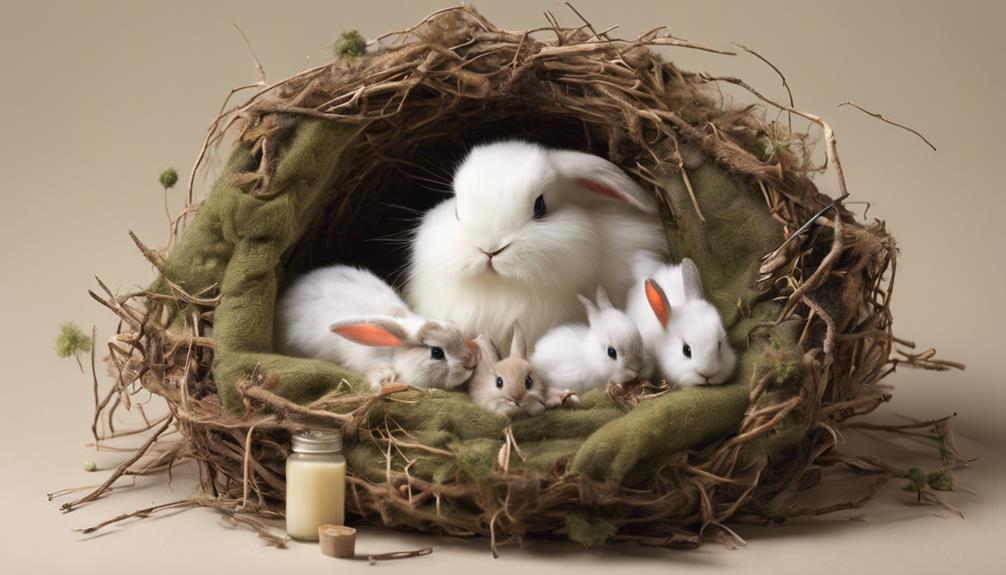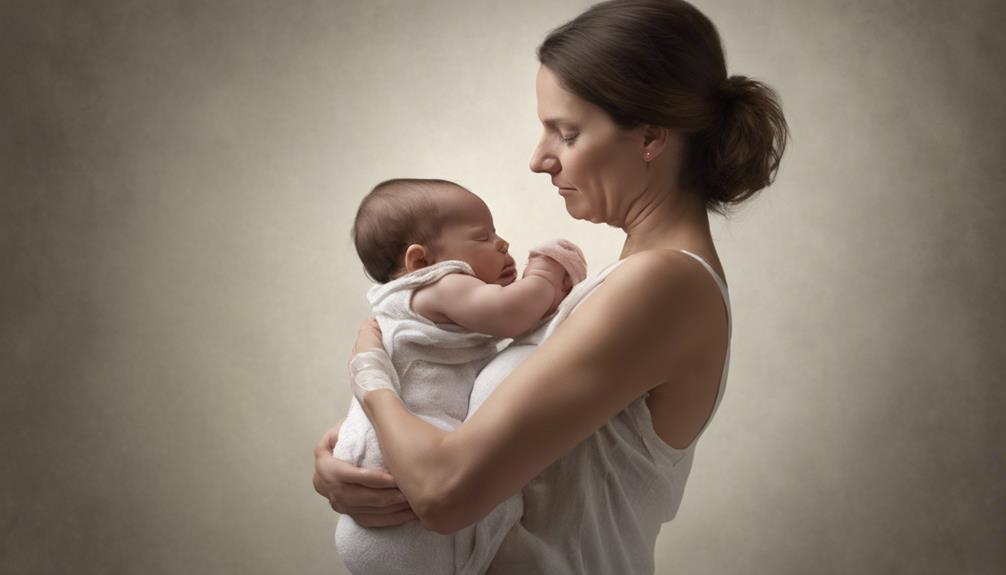As caregivers, we recognize that annually, thousands of infant rabbits are left alone and require assistance. It’s crucial for their health to be aware of the vital care instructions for these fragile animals.
From providing warmth to ensuring proper nutrition, each step plays a crucial role in their survival. By following these top 10 care tips meticulously, we can make a significant difference in the lives of these abandoned newborn bunnies.
Let's explore these tips together to learn how we can best support these little ones in need.
Key Takeaways
- Maintain a warm environment at 85-90°F to prevent hypothermia.
- Provide proper hydration with a water bottle and specialized formulas.
- Create a safe, predator-proof environment with secure hiding spots.
- Monitor health indicators closely and seek prompt veterinary assistance when needed.
Providing Warmth
To keep abandoned newborn bunnies warm and healthy, it's essential to maintain a consistent temperature of 85-90°F. We recommend using an electric heating pad set on low or a warm water bottle wrapped in a towel to provide the necessary warmth. It's important to maintain that there's no direct contact between the bunny and the heat source to prevent any potential burns.
When setting up the heat source, always monitor the bunny's comfort level and behavior. Adjust the heating pad or water bottle as needed to sustain the best temperature range. Proper warmth is crucial for the survival and development of newborn bunnies, so it's significant to be attentive and responsive to their needs.
Hydration and Feeding
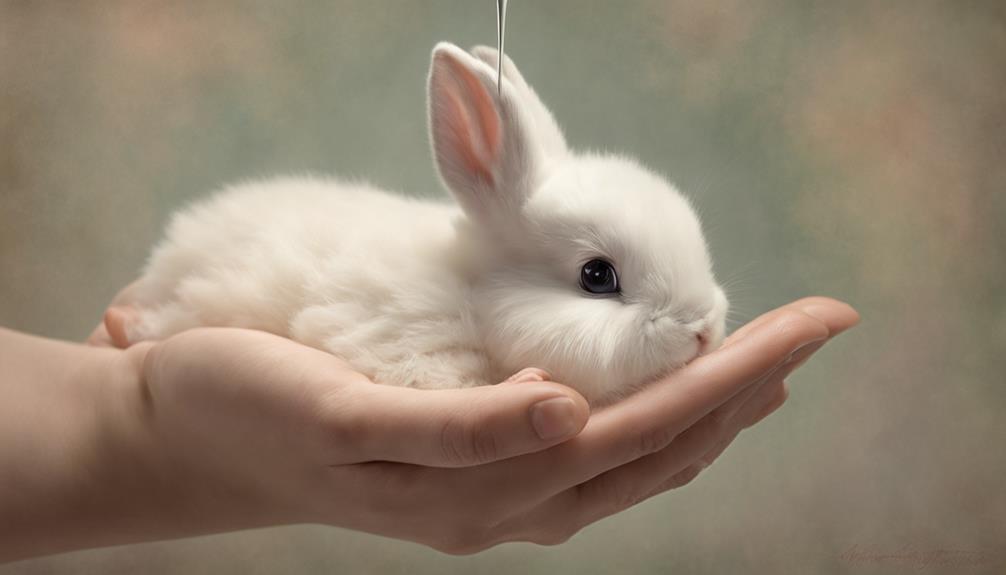
When caring for abandoned newborn bunnies, ensuring they stay hydrated is crucial.
We recommend using a water bottle specifically designed for small animals and avoiding milk replacement formula.
These simple steps can make a significant difference in the well-being of these tiny creatures.
Water Bottle for Hydration
Using a water bottle with a small nozzle is essential for ensuring proper hydration for abandoned newborn bunnies. We acknowledge the importance of keeping these delicate babies well-hydrated to support their health and growth. Here is a helpful table to guide you on the proper use of a water bottle for your baby rabbits:
| Water Bottle Tips | Benefits |
|---|---|
| Securely attach the bottle | Prevents spills and contamination |
| Control water flow | Helps prevent choking and aspiration |
| Monitor water intake | Ensures proper hydration |
| Hydration is crucial | Prevents dehydration and supports well-being |
Milk Replacement Formula
Ensuring proper hydration and nutrition for abandoned newborn bunnies involves selecting the right milk replacement formula that mimics the mother rabbit's milk composition. When caring for baby rabbits, feed them with the appropriate formula to support their growth and health.
Here are some essential tips for choosing the best milk replacement formula:
- Avoid Cow's Milk: High lactose content can be harmful to baby rabbits.
- Choose Specialized Formulas: Opt for commercially available kitten milk replacers or specialized rabbit milk replacers.
- Consult Professionals: Seek advice from a wildlife rehabilitator or veterinarian on selecting the most suitable formula.
- Ensure Nutrient Balance: Select a formula that provides essential nutrients for the well-being of wild baby rabbits.
Establishing a Safe Environment
When caring for abandoned newborn bunnies, it's important to create a safe environment for their well-being.
We recommend providing secure hiding spots, controlling the temperature in the nesting area, and predator-proofing the surroundings.
These measures help make sure the baby rabbits feel secure, comfortable, and protected during this critical period of their lives.
Secure Hiding Spots
To create a safe haven for abandoned newborn bunnies, consider providing a cozy hiding spot that mimics the comfort of their natural nest environment. Here are some tips to establish secure hiding spots for the baby bunnies:
- Covered Box: Use a covered box with soft bedding to offer a sense of security and warmth.
- Warm and Quiet: Make sure the hiding spot is warm, quiet, and away from disturbances to reduce stress on the newborn bunnies.
- Natural Materials: Use hay, shredded paper, or towels for bedding to create a comfortable and familiar space.
- Dim Lighting: Place the hiding spot in a dimly lit area to simulate the darkness of a burrow and promote a sense of safety for the baby rabbits.
Temperature Control Measures
As caretakers for abandoned newborn bunnies, creating a safe and controlled environment with proper temperature control is essential for their well-being and survival. Baby rabbits are delicate creatures that require a consistent temperature of around 85-90 degrees Fahrenheit to thrive. To achieve this, consider using a heating pad set on low or a heat lamp positioned at a safe distance from the nesting area. Monitoring the temperature regularly with a thermometer placed nearby is important to prevent hypothermia, which can be fatal. Remember to avoid direct contact between the bunnies and the heat source to prevent burns or overheating. Here's a table summarizing essential temperature control measures:
| Temperature Control Measures | Description | Importance |
|---|---|---|
| Consistent Heat | Maintain 85-90°F for baby rabbits | Important for survival |
| Heating Pad or Heat Lamp | Use on low setting, at a safe distance | Regulate temperature |
| Monitoring | Regularly check with a thermometer | Prevent hypothermia |
Predator-Proofing the Area
Ensuring the nesting area is secure from predators is an essential step in establishing a safe environment for abandoned newborn bunnies. As caregivers of these vulnerable rabbits, we must take precautions to protect them from potential harm. Here are some crucial tips to predator-proof the nesting area:
- Use a covered box with a secure lid to shield the bunnies from predators.
- Be aware that common predators of baby rabbits include cats, dogs, birds of prey, and snakes.
- Avoid placing the nest in high-traffic areas or where predators are known to frequent.
- Employ deterrents like motion-activated lights or noise machines to deter potential predators.
Handling With Care
When handling newborn bunnies, it's important to approach them gently with clean hands to guarantee their comfort and well-being. These babies are delicate, and the way we handle them can greatly impact their health and happiness. Supporting their body properly is vital to prevent any accidental injuries.
It's significant to remember that domestic bunnies can be easily stressed, so avoiding excessive handling is key. Using a soft, warm cloth to pick them up provides them with comfort and security, mimicking the feeling of being with their mother.
Creating a quiet environment while handling newborn bunnies can help keep them calm and at ease. By being mindful of these tips and handling these precious creatures with care, we can make sure they feel safe and loved in their new environment.
Monitoring Health Signs
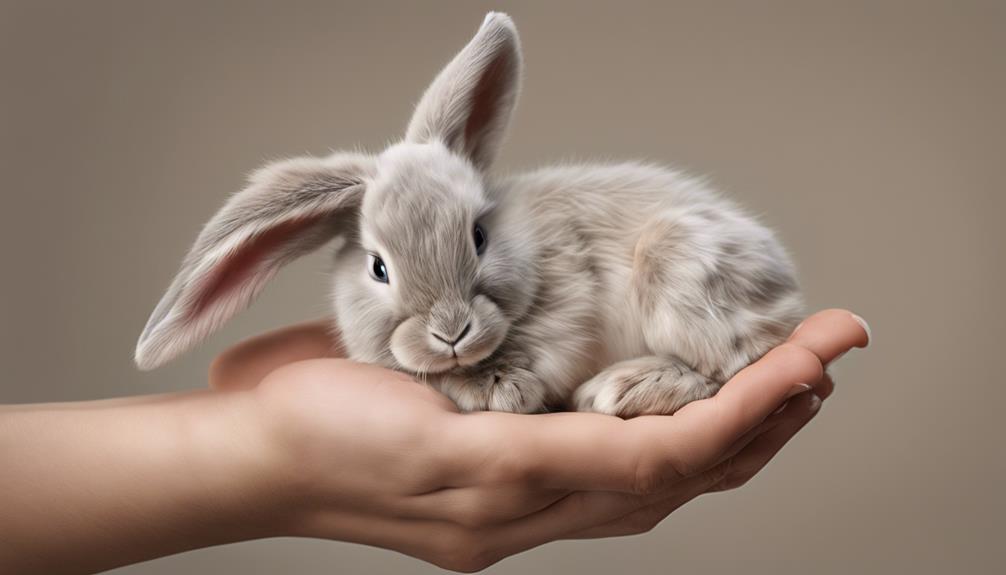
As caregivers, it's essential to stay vigilant for signs that might indicate health issues in newborn bunnies. Watching out for indicators like dehydration, bloating, weight changes, abnormal discharges, and breathing patterns can help us catch problems early.
If we notice any abnormalities, seeking advice from a veterinarian is vital to make sure the best care for these delicate creatures.
Vital Health Indicators
Monitoring the essential health indicators of an orphaned bunny is important for their well-being. As caregivers of these vulnerable wild babies, we must pay close attention to the following key signs:
- Weight: Daily monitoring guarantees they're growing properly.
- Skin Elasticity: Pinch gently to check for dehydration; skin should quickly return to normal.
- Bottom Hygiene: A clean, dry bottom is a good sign; any dirtiness may indicate health issues.
- Activity Level: Lethargy or excessive sleep could be red flags for underlying problems.
These indicators, along with watching for any eye, nose, or ear discharge, help us detect issues early on and provide the best care for our precious little ones.
Watch for Abnormalities
Observing for any abnormalities in an orphaned bunny's health signs is important for ensuring their well-being and early detection of potential issues. When caring for a wild rabbit or an orphaned baby whose eyes are open, it's essential to provide extra attention to their health indicators. Keep a close eye out for any unusual symptoms that may indicate underlying problems. Here is a helpful table to guide you in monitoring the health of the baby bunny:
| Abnormalities to Watch For | Possible Health Issues |
|---|---|
| Discharge from eyes, nose, or ears | Infection |
| Excessive scratching or listlessness | Parasites or illness |
| Bloating or distended belly | Digestive problems |
Seek Veterinary Advice
Watching over an abandoned newborn bunny's health signs involves staying vigilant for any abnormalities that could signal underlying health issues, prompting the need to seek veterinary advice promptly. If you notice any concerning symptoms or changes in the baby bunny's condition, it's essential to act swiftly.
Here are some key steps to monitor the health of the abandoned newborn bunny:
- Regularly monitor weight and growth: Make sure the baby bunny is developing properly.
- Look for signs of illness: Keep an eye out for lethargy, loss of appetite, or unusual behavior.
- Seek veterinary advice promptly: Contact a wildlife rehabilitator or a vet experienced with domestic rabbits.
- Keep detailed records: Note any health concerns or observations to provide accurate information to the veterinarian.
Early intervention can make a significant difference in the baby bunny's well-being.
Seeking Veterinary Assistance
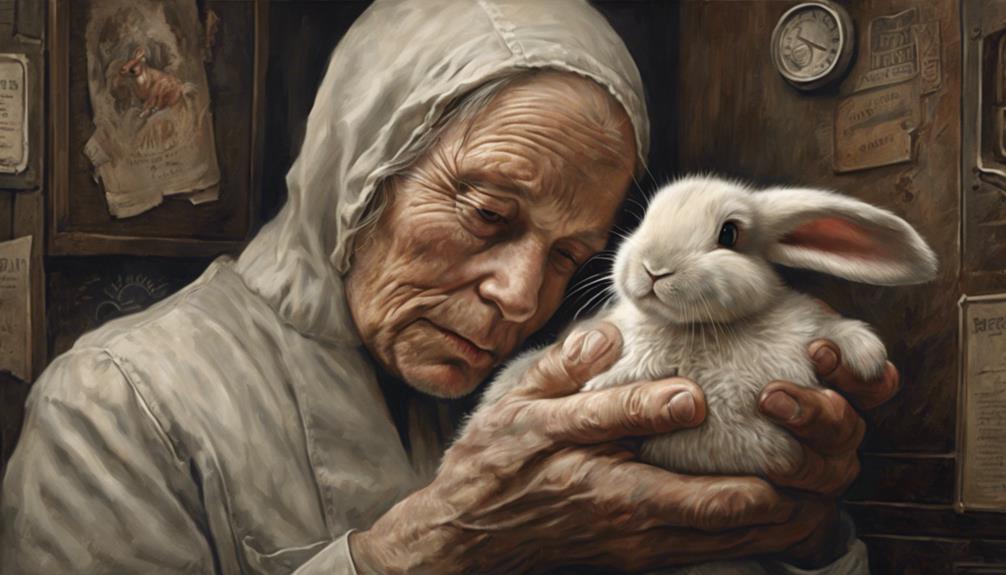
Seeking veterinary assistance promptly is important when caring for abandoned newborn bunnies to guarantee their health and well-being. A veterinarian plays a critical role in evaluating the needs of these fragile creatures, providing expert guidance on feeding, hydration, and overall care. Professional veterinary care is essential for addressing any underlying health issues the newborn bunnies may have and ensuring they receive the appropriate treatment. Veterinarians possess the expertise to diagnose and manage any medical conditions that may arise in these vulnerable animals, greatly improving their chances of survival and well-being.
| Veterinary Assistance | Importance |
|---|---|
| Health Assessment | Critical |
| Feeding Guidance | Essential |
| Hydration Support | Vital |
| Overall Care Advice | Necessary |
When dealing with abandoned newborn bunnies, seeking veterinary assistance is not just beneficial but imperative for their welfare. These tiny creatures rely on us to provide the best possible care, and a veterinarian's expertise can make a significant difference in their lives.
Mimicking Motherly Care
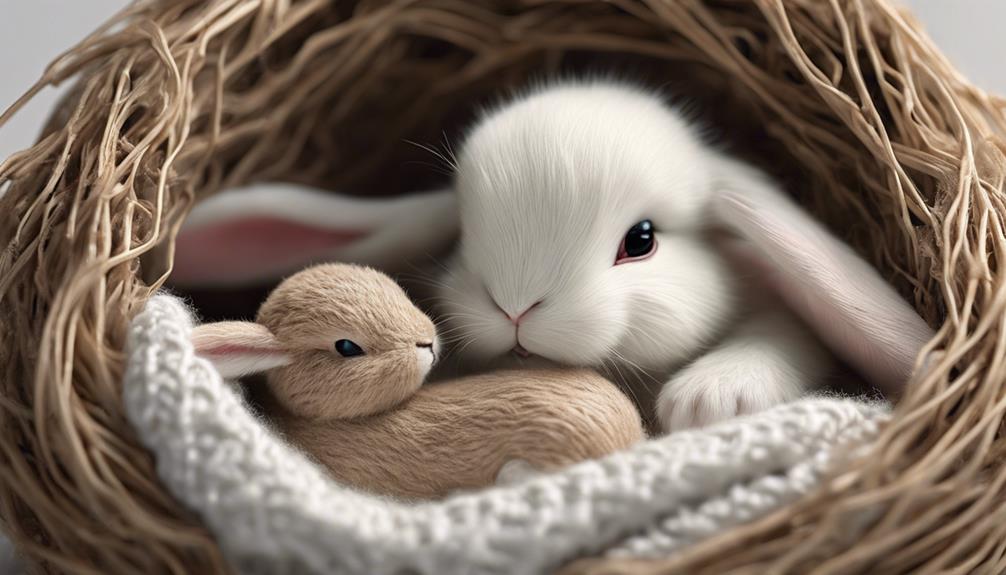
To mimic motherly care for abandoned newborn bunnies, creating a warm, dark, and quiet environment is essential. This helps replicate the comforting space a mother rabbit provides for her young. Here are some steps to guarantee the baby bunnies feel secure and nurtured:
- Secure Nest: Construct a cozy nest with soft bedding to mimic the mother rabbit's nurturing environment.
- Comforting Sounds: Place a ticking clock or play soft music near the nest to mimic the soothing sounds the mother rabbit provides.
- Limit Handling: Avoid excessive handling to prevent stress and simulate the mother's absence during feeding times.
- Feeding Schedule: Mimic the mother rabbit's feeding schedule by providing warmth and feeding the baby bunnies at regular intervals.
Avoiding Overfeeding
Creating a balanced feeding routine is key to ensuring the health and well-being of abandoned newborn bunnies, particularly when it comes to avoiding overfeeding to prevent gastrointestinal issues. Overfeeding baby wild rabbits can lead to serious problems like bloating and diarrhea, which can be harmful to their delicate digestive systems. To avoid overfeeding, it's vital to follow a feeding schedule and portion sizes recommended by a wildlife rehabilitator. These experts can provide guidance on the right amount of formula to feed and the frequency of feeding sessions.
Monitoring the baby rabbit's weight and behavior is essential in preventing overfeeding. By observing how they react to the feedings, you can adjust accordingly to make sure they're getting just the right amount. It's important to strike a balance between feeding frequency and portion sizes to avoid overwhelming their tiny stomachs. Remember, the goal is to nurture these vulnerable creatures without causing harm through overfeeding.
Gradual Weaning Process
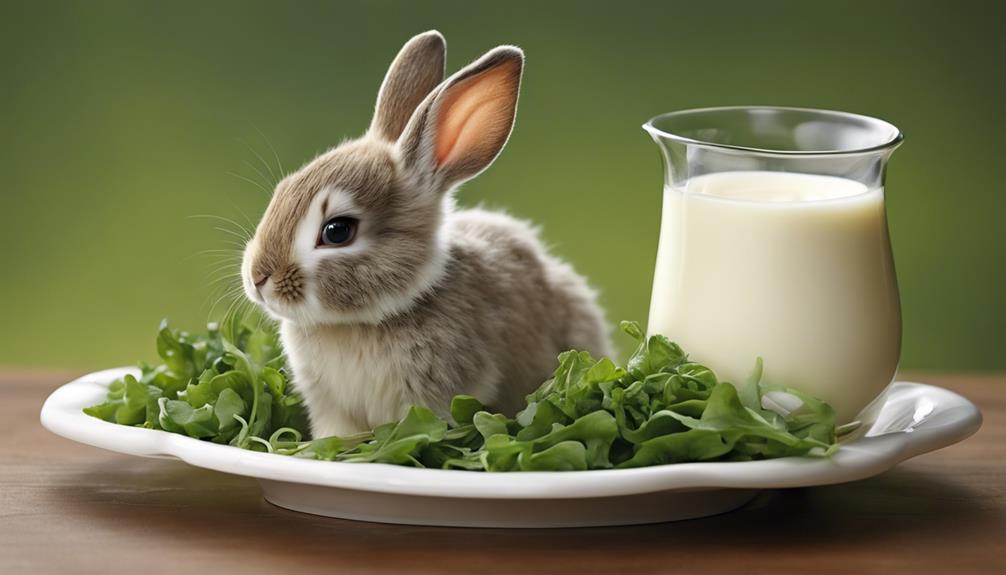
As we approach the 6-8 week mark, it's time to initiate the gradual weaning process for baby rabbits. This is a pivotal stage in their development where they shift from formula feedings to a diet of fresh vegetables and hay. Here's how you can help your baby cottontails through this weaning process:
- Decrease Formula Feedings: Start reducing the frequency of formula feedings gradually to encourage them to start eating solid foods.
- Introduce Diluted Formula: Mix their formula with water to dilute it, helping baby rabbits shift to a diet of solid foods more easily.
- Offer Fresh Vegetables: Provide a variety of fresh vegetables alongside hay to support a balanced diet during the weaning process.
- Monitor Closely: Keep a close eye on the baby rabbits during this period to ensure they're adjusting well to the new foods and are getting the nutrition they need.
With patience and care, you can help your baby rabbits smoothly shift from formula to a diet of fresh veggies and hay.
Preparing for Release

When preparing abandoned newborn bunnies for release back into the wild, make sure they're at least 6-8 weeks old and in good health. It's important to select a suitable release location that provides access to food, water, and shelter for these wild animals.
Observing the bunnies post-release is essential to make sure they adjust well to their new environment. Allow them time to explore and become familiar with the release area, helping them feel more at ease.
Seeking advice from wildlife rehabilitators can offer valuable insights into successfully releasing these young rabbits. Remember, the welfare of these creatures is paramount, and taking the necessary steps to prepare them for life in the wild is a responsibility we must approach with care and consideration.
Frequently Asked Questions
How Do You Take Care of an Abandoned Baby Bunny?
We guarantee warmth with a cozy nest and consult a wildlife expert before feeding to avoid digestive issues. Keeping the bunny in a quiet, dark place is crucial, and seeking guidance for proper care is essential.
How Do You Take Care of a Newborn Rabbit Without a Mother?
When caring for a newborn rabbit without a mother, guarantee warmth, consult a professional before feeding, provide a quiet environment, and avoid giving water independently. Following expert advice on care and feeding is crucial for the little one's survival.
What Do Abandoned Newborn Bunnies Eat?
When abandoned, newborn bunnies need a special formula warmed to body temperature every 3-4 hours. Avoid cow's milk or baby formula. Seek advice from a vet or wildlife expert. Feeding and care is crucial.
Can Newborn Bunnies Survive Without Their Mother?
Without their mother, newborn bunnies struggle to survive due to their vulnerable state. They need constant care, warmth, and nutrition. Professional help is crucial for their chances. Abandoned newborn bunnies face serious risks without maternal care.
Conclusion
To sum up, caring for abandoned newborn bunnies requires dedication and knowledge. Remember, Rome wasn't built in a day, and neither is the process of helping these fragile creatures thrive.
By following the top 10 care tips diligently, you can make a difference in their lives and guarantee they've the best chance at returning to the wild.
Together, let's give these little ones the care and support they need to hop back into nature where they belong.
